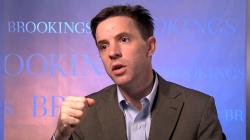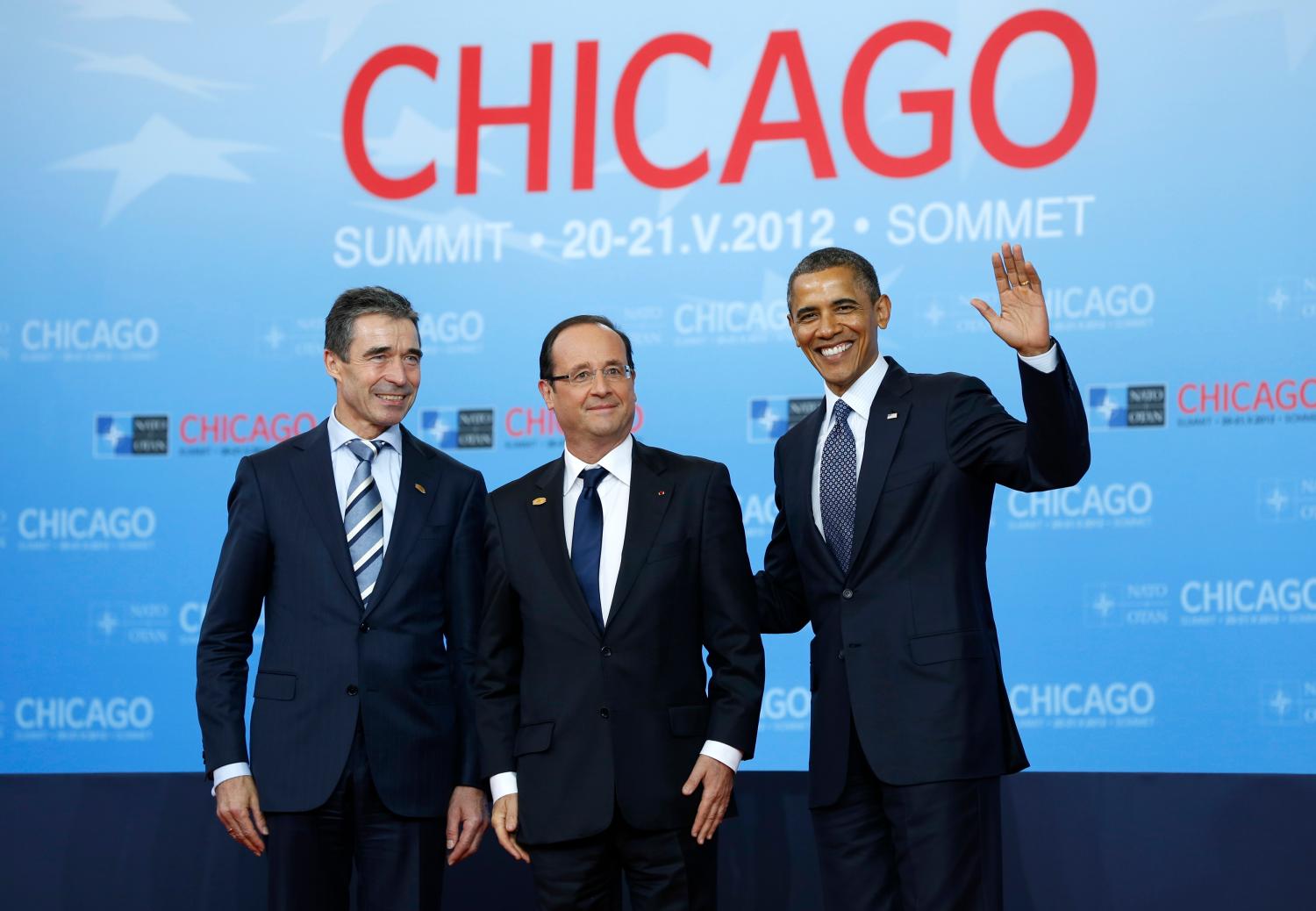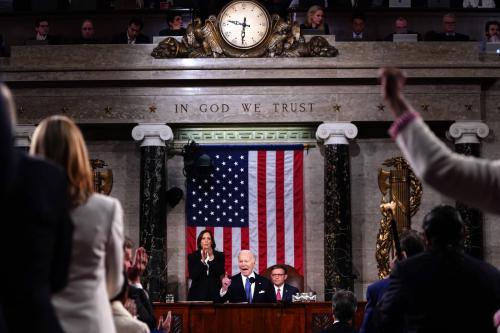It would be unfair to blame the Americans for a lack of interest in the 2012 French presidential election: up until the last few weeks even the French themselves were not interested in it and for a long time it was feared that there would be massive abstentionism. The fact is that very few serious articles appeared on the subject in the United States, with little detailed reporting on the main candidates, for example, and where they did not recount slightly nonsensical tales (the idea that the Toulouse terrorist attacks “saved” Nicolas Sarkozy’s campaign was particularly widespread, whereas a mere glance at the polls was enough to prove this to be wrong), they painted a depressing picture. It was a picture of France with a broken social fabric, entering a phase of denial of its own disastrous economic reality in a Europe plunging downwards, where the hard-pressed president was inciting xenophobia whilst playing on the class war to try to struggle out of his electoral difficulties. As for the socialist candidate, he was said to be leading the country towards suicide with his proposed higher tax bracket of 75%. Back in 2007 things were very different, the candidate Nicolas Sarkozy attracted media curiosity and ensured newspaper sales (as was the case in France), Ségolène Royal intrigued the U.S. public and America generally paid a great deal more attention to the French presidential race.
As if that were not enough, America is itself in the throes of the Republican primary campaign, such that many candidates use France and Europe as foils. Newt Gingrich stigmatizes Mitt Romney because he speaks French, like John Kerry, that other liberal from Massachusetts (even though Newt himself speaks French), and Romney accuses Obama of wanting to transform American into a second Europe, described as being “weak, socialist and object of pity and, compared with the shining American model, lacking inspiration”. As for Rick Santorum, he has declared that France has not supported the United States once on the international scene over these past twenty years—his way of attacking the supposed naivety of Barack Obama who declared, on meeting Prime Minister [sic] Nicolas Sarkozy, that France was the United States’ best ally.
Actually, it is precisely this good Franco-American understanding which explains why the Administration, for its part, was not particularly inclined to see change. In short, it was voting Nicolas Sarkozy. This was not simply because it knew what it was losing should Sarkozy be defeated, without actually knowing what it could gain with François Hollande at the Elysée. It was also that Franco-American cooperation was, for four years, very good on most of the topics of importance for Obama. On Iran, Sarkozy had adopted Jacques Chirac’s firm line, which went back to 2002, and hardened it still further—calculating that tougher sanctions would result in a compromise and avoid American or Israeli strikes instead of legitimizing them as had happened, more or less, in the Iraq case. In particular, he encouraged the Europeans to adopt tougher sanctions, thereby making the Administration’s job easier, and giving it better arguments, vis-à-vis the Israelis, to continue the negotiation route—even though Sarkozy sometimes seemed to threaten Obama on his right, with a position closer to that of Congress and, particularly, the Republican Chamber of Representatives, than to that of the Executive, for example with regard to sanctions against the Central Bank of Teheran.
A very good level of cooperation was also achieved with the intervention in Libya in 2011, although this was not without friction, particularly during the first few weeks of operation. France did not want to see NATO involved, whereas from Obama’s point of view, who did not want another American war in the Middle East, that was the best way of placing the United States in a backseat position rather than as a direct operational commander, as was the case from 19th March to the early days of April 2011. However, pressure from the United States and European partners, particularly Italy, got the better of French preferences and enabled the U.S. to “lead from behind” through the good offices of NATO, as Obama had wished, although he rejected this particular slogan. On Syria, Obama and Sarkozy also held the same line—Paris’ overtures to Damas at the beginning of his mandate, which were not to the taste of the Administration, having ceased with the start of the demonstrations/repressions cycle in 2011—even though it is a policy that is highly constricted by the Security Council, realities in the field and Obama’s wariness in this electoral year.
The return to NATO’s integrated military command enabled, at the very least, a general appeasement of suspicions against European defense; here again the positions of the Obama administration and France have been very similar. It is David Cameron’s British government that finds itself isolated, more Atlanticist than America, blocking on questions such as the CSDP operational headquarters, a breakthrough supported by the Germans and the Poles—with the Americans supporting anything that may contribute to maintaining European defense efforts. Over these past few years we have seen a weakening of the Anglo-American special relationship, struck by the disillusionment caused by the wearing down of British military capacity and specific frictions in terms of Iraq and Afghanistan, along with increasing skepticism regarding London’s European strategy. If the United Kingdom becomes marginalized within the EU, as was the case in December 2011 with the European budgetary pact, it can no longer act as a trans-Atlantic bridge, as a representative of liberal Atlanticist sensitivity to balance the Franco-German couple—then what use is it to the United States?
Because, over and above good Franco-American bilateral cooperation on many Middle-Eastern or global topics, such as the G20 in 2011, Washington, adapting its approach to the transformations of European equilibrium further to the Euro crisis (weakening of Brussels, marginalization of London, ascension of Berlin) saw France as a useful counterweight to the deflationist tendencies of Angela Merkel. Obama and Sarkozy have found themselves aligned on numerous occasions during the crisis—in favor, for example, of a stronger firewall, of more direct and robust intervention by the ECB, of reflation etc.—and Washington relied on France to correct the depressive effects of the “German remedy”. This is all the more important because Obama’s re-election depends on the strength of the U.S. economy and the scenario most feared by his campaign team is that of a sudden relapse in Europe.
If François Hollande had any appeal with the White House before the election, it was exactly on this point. Nicolas Sarkozy, out of realism more than conviction, had to “stick” to Angela Merkel’s positions on the European budgetary pact. As soon as the agreement was reached in December 2011, the socialist candidate announced his intention to demand its re-negotiation if he was elected, to add, he said, a clause on growth. However, since then, European activity forecasts have been reviewed downwards for this year (stagnation for the European Union and a drop of 0.3% for the eurozone, with many countries in recession), and most players and observers—markets, company bosses, European governments—have underlined the insufficiency of an approach based solely on budgetary discipline, and the need to avoid suffocating activity, which could re-start the euro crisis dramatically. With François Hollande rather than Sarkozy at the Elysée, he was seen as more likely to obtain a new European agreement, perhaps in the form of an additional protocol aimed at supporting growth, from Angela Merkel, and support from conservative leaders such as Mariano Rajoy who avoided him during the campaign, and also with the help of the SPD, which Merkel needs in order to ratify the Pact. That, of course, was something which was viewed very favorably by the White House.
Moreover, the socialist candidate took care to send reassuring signals to Washington in March, through the intermediary of two of his close allies, Jean-Yves Le Drian (President of the Brittany region and head of defense questions for the campaign, and who has since been appointed Minister of Defence) and Jean-Pierre Bel (President of the Senate). He announced continuity on the Iranian and Syrian questions, as well as with regard to NATO. Although François Hollande was opposed to complete reintegration of military command in 2008, and announced he would ask for a cost / benefits assessment of this initiative during his first few months as president should he be elected, he never intended to call it into question and envisage another withdrawal. The defense budget will not be subject to any kind of brutal cuts, although it will contribute to the deficit reduction. A new White Paper, said the candidate, will be written to take account of developments in the American posture, as announced in the new American strategic review published in January 2012.
With regard to promises made by the candidate which could impact American interests head on (more than Sarkozy’s positions), François Hollande insisted on the method he would follow. Capitalizing on the irritations created by French diplomacy of the last few years which was sometimes viewed as being unpredictable, even impulsive (from the position taken in favor of the Palestinians at the UN and the vote at UNESCO on this subject in the autumn of 2011, through to the surprise announcement of an early withdrawal of troops from Afghanistan after the death of four French soldiers in January 2012, many French initiatives have been taken without consulting Washington), he has highlighted his “anti-Sarkozy” features: he will be transparent and predictable for his partners.
This is how he intended, he announced during the campaign, reduce friction on the two matters that were really causing a problem for the Obama administration: Afghanistan and anti-missile defense. It is true that François Hollande announced long ago that he would begin the withdrawal of combat troops from Afghanistan as soon as he was elected, to ensure that it became effective before the end of 2012 – i.e. two years earlier than the agreement made with NATO and a year earlier than the date announced by Sarkozy (Defence Secretary Leon Panetta also announced in February that American soldiers would move from combat to training activities in 2013). Even though logistics problems risk making this a difficult promise to keep in any case, it poses a real problem for the administration – a modest military problem, but a real problem from the point of view of the Atlantic Alliance. Similarly, the candidate expressed his skepticism with regard to Obama’s anti-missile system (Phased Adaptive Approach), for both budgetary and strategic reasons (at least partial challenging of the nuclear dissuasion strategy which is already very expensive) and even though the anti-missile defense strategy was adopted as being one of NATO’s core missions at the Lisbon summit in 2010. Through his emissaries, candidate Hollande assured the administration of his desire not to put Obama into difficulty at the NATO summit in Chicago on 20th & 21st May, an important moment in his own campaign for re-election in terms of international affairs.
However, it would appear that these gestures of goodwill were not sufficient to counterbalance the White House’s preference for continuity. On 12th April, ten days before the first round, Obama authorized the diffusion in France of the first few minutes of his videoconference with Nicolas Sarkozy, during which he declared “I admire the tough battle you are waging,” to which Sarkozy replied optimistically but non-prophetically, “We’re going to win, Mr. President … You and me”. Barack Obama would have done well to abstain from this type of gesture: it was doubtful that it would win many votes for the French president, whereas it would clearly displease his socialist competitor, the favorite in the polls, and his staff. It was doubtless his own personal loyalty to Nicolas Sarkozy which won over in the matter, although it was known that the two men were not close and that their relationship, excellent in political terms, had never reached the degree of trust and personal proximity that Sarkozy had wished.
Now that François Hollande has been elected, what is Washington’s reaction? Obama tried to catch up on lost time by being one of the first to call François Hollande on the evening of 6th May. A few days later, he sent two French-speaking Francophile representatives, Phil Gordon (Deputy Secretary of State for Europe and Eurasia) and Tony Blinken (Vice President Biden’s security advisor), not only to talk about subjects of dispute, like Afghanistan (where a compromise quickly came to light), but also for an overview of international matters. Of these subjects, it is of course the euro crisis that continues to be of most concern to the White House, in view of the uncertainty that weighs on the Greek situation. As predicted, Obama has leaned towards the new European consensus in favor of growth, embodied by François Hollande. In Seattle, on 10th May he declared that if Europe was in a difficult position it was because it had not taken the decisive reflation measures that he himself took in 2009—a declaration that ignores the specific aspects of the American situation, where it is much easier (and more necessary) to increase the budget deficit in times of crisis than it is in Europe, in view of the sustained investment flow and explicit support for its government from the US central bank.
It is no surprise, in these circumstances, that the bilateral meeting between Obama and Hollande on 18th May was not only cordial (70 minutes interview, of which 20 minutes in strict one-to-one discussions: it was a case of making up for lost time), but also served to demonstrate the convergence of views between the two presidents in terms of the Euro crisis, in favor of a changed balance between discipline and reflation. Similarly, the G8 summit at Camp David, begun that very evening with a dinner and continued the following day, resulted in a communiqué which clearly put the sights on growth (whilst mentioning, of course, the importance of fiscal consolidation). Of course Obama cannot go too far: he cannot isolate Angela Merkel, and he cannot appear to interfere with the Europeans, or teach them a lesson when the United States has neither the financial nor the political resources to intervene decisively in the Eurozone crisis. It is true, however, that in order to preserve his chances of re-election, he is naturally inclined to give priority to reflation rather than austerity in order to avoid the nightmare scenario of a brutal downfall of growth in Europe, which would contaminate the United States over the summer. There can be no doubt, therefore, that for the first few months of François Hollande’s mandate, who is in a key position to reach a European agreement of this kind, Obama will remain an ally of the French president—to the point that “Sarkozy the American” may soon be forgotten.




